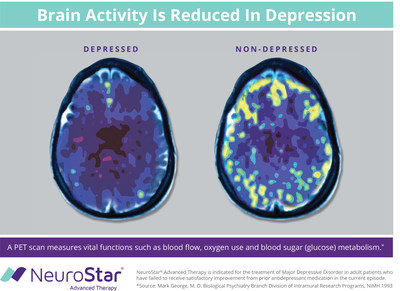NeuroStar® Advanced Therapy Survey Finds Majority of Americans Don't Feel Very Equipped to Discuss Depression With Loved Ones

While depression is one of the most common mental health disorders in the U.S.,1 and one that has been part of worldwide dialogue, even among notable celebrities, NeuroStar's survey results reveal less than 1 in 5 Americans (18 percent) feel very equipped to reach out to a loved one if they think their loved one is suffering from the disease. Moreso, more than half of Americans (56 percent) believe one of the biggest barriers preventing people from reaching out to a loved one they think might be suffering from depression is that they are unsure of how to bring it up in the first place. Additionally, only about a quarter of Americans (27 percent) are aware that depression is a disorder of the brain.
"Our survey findings not only reinforce the incredible need for education on the topic of depression, but also underscore the importance of ensuring Americans feel equipped to have these potentially life-saving conversations about mental health," said
With more than 2.3 million treatments delivered, NeuroStar was the first TMS device to receive
Key survey findings spotlight:
Americans do not fully grasp depression as the debilitating disease it is.
- While nearly 9 in 10 Americans (87 percent) believe cancer is a very serious health condition, less than two-thirds (65 percent) say the same about depression.
- There are very real differences between a depressed and non-depressed brain based on brain scans of the two groups, yet only about one-quarter of Americans (27 percent) know depression is a brain disorder.
There are barriers and concerns about bringing up depression with family and friends, and some would even go as far as to put themselves in an uncomfortable situation instead of addressing the topic.
- Few Americans (18 percent) feel very equipped to reach out to a loved one about depression if they thought they were suffering from it, and perhaps this is why nearly 1 in 5 (18 percent) would rather accidentally call someone by the wrong name than have a discussion with a loved one they think might be suffering from depression.
Platforms like television can negatively impact people's portrayal of and experience with mental health.
- One-third (34 percent) of Americans think recent portrayals of depression in movies and TV shows have had a negative impact on how people view the illness.
- Of those who have ever been on social media, more than 3 in 5 Americans (63 percent) say social media posts have brought them down, and of those who ever watch TV, two-thirds (67 percent) say that TV shows have brought them down.
"There is a big misconception that depression means you're always sad, something that was not the case for me. I didn't fit people's stereotypical image of depression; they didn't see how I could be depressed," said patient advocate
To get involved in the conversation during Mental Health Awareness Month, follow NeuroStar on
About the Survey
This survey was conducted online within
About NeuroStar® Advanced Therapy
NeuroStar® Advanced Therapy is the established leader in transcranial magnetic stimulation (TMS), a non-invasive form of neuromodulation. NeuroStar Advanced Therapy is the #1 TMS choice of doctors, and widely available across the
NeuroStar is reimbursed by most commercial and government health plans in
NeuroStar is indicated for the treatment of MDD in adult patients who have failed to receive satisfactory improvement from prior antidepressant medication in the current episode. In an NIMH-funded, independent, randomized controlled trial, patients treated with TMS using a clinical-trial version of the NeuroStar TMS System were four times more likely to achieve remission compared to patients receiving sham treatment (P = 0.0173; odds ratio = 4.05).5 The most common side effect is pain or discomfort at or near the treatment site, which usually resolves within one week. It is contraindicated in people with non-removable conductive metal in or near the head.
NeuroStar® is a registered trademark of
1
2 Post A, et al. (2001)
3 Liston C, et al. (2014) Biol Psychiatry. 76(7):517-26
4 Janicak PG, et al. J Clin Psychiatry, (2008)
*Treatment time may vary depending on a doctor's recommendation.
5 George MS, et al. Arch Gen Psychiatry, (2010)
![]() View original content to download multimedia:http://www.prnewswire.com/news-releases/neurostar-advanced-therapy-survey-finds-majority-of-americans-dont-feel-very-equipped-to-discuss-depression-with-loved-ones-300849399.html
View original content to download multimedia:http://www.prnewswire.com/news-releases/neurostar-advanced-therapy-survey-finds-majority-of-americans-dont-feel-very-equipped-to-discuss-depression-with-loved-ones-300849399.html
SOURCE
Meagan Dominick, Office: 610-455-2779, mdominick@vaultcommunications.com